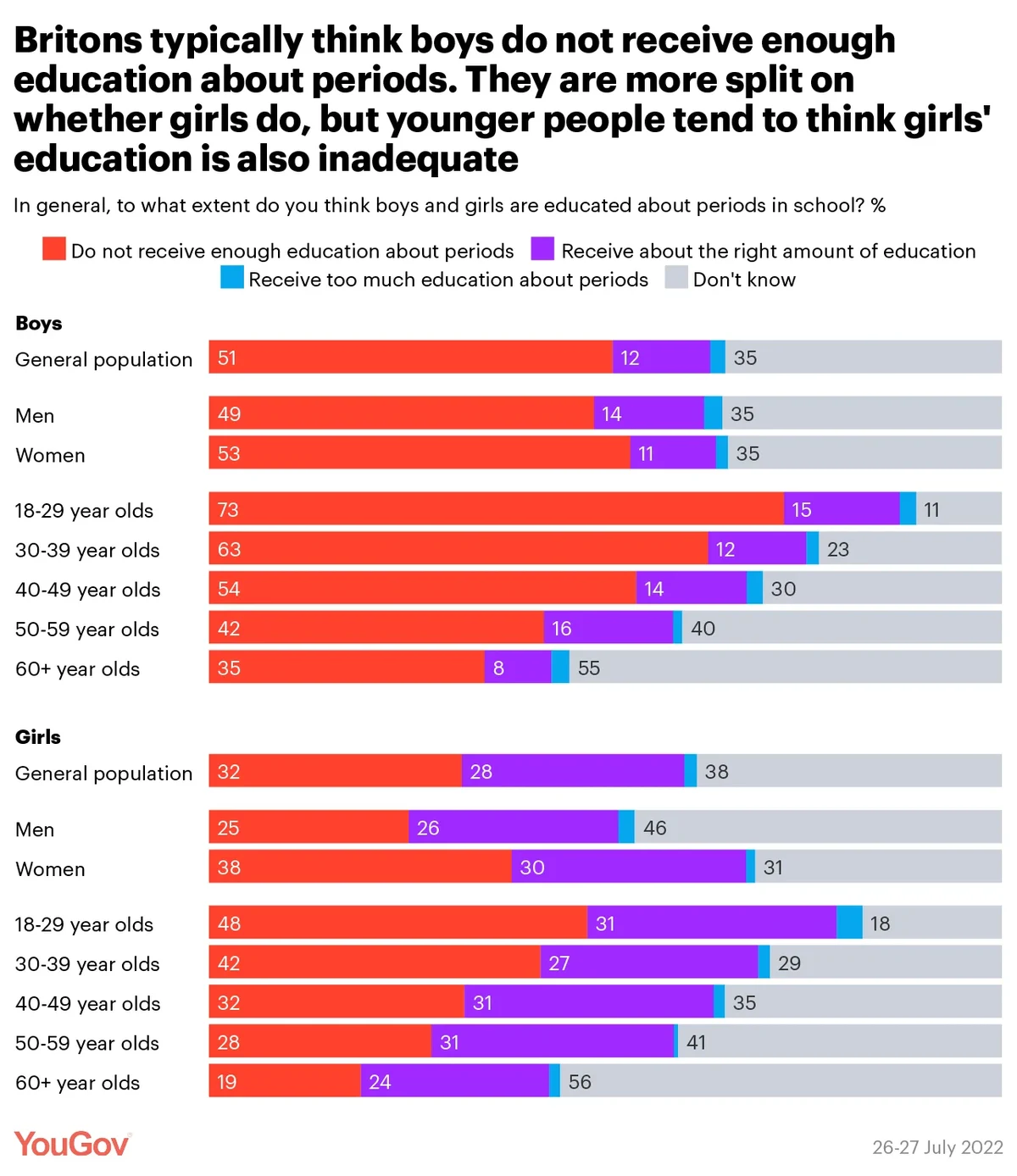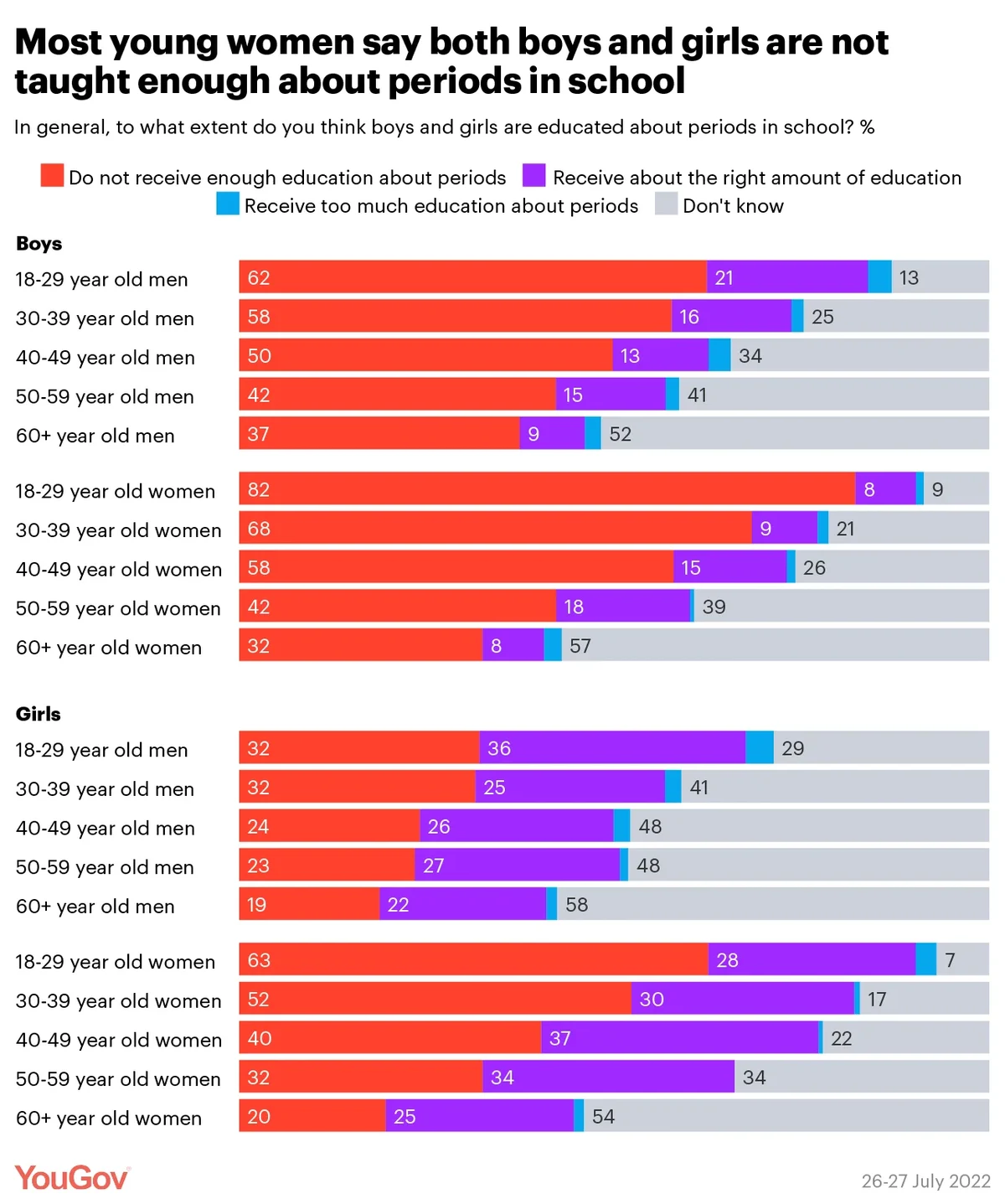Those girls who say they felt most prepared for their first period are substantially more likely to say they were first taught about menstruation by a parent
Earlier this year, a study led by Swansea University suggested UK schools are not doing enough to teach their pupils about periods and the menstrual cycle.
Now a new YouGov study shows that Britons tend to think period education in schools is insufficient – particularly for boys. The study also looks at how people were first taught about menstruation, and how impactful it is for girls to be well-prepared for the experience ahead of their first period.
Do girls and boys get taught enough about periods and menstruation in schools?
Britons tend to think that boys in particular do not receive enough education around periods at school. Half (51%) believe this to be the case, compared to only 12% who think they receive about the right amount of education. Only 2% think boys are taught too much about menstruation, with a large number of people unsure (35%).
When it comes to whether girls are getting taught enough about periods, the response is more divided. One in three (32%) believe girls are not taught enough, compared to 28% who think they receive an adequate level of education (and 38% who are unsure).
These high “don’t know” response rates are driven primarily by older Britons: 55-56% of those aged 60 and above are unsure. If we look at the youngest age group – 18-29 year olds – certainty is much higher, and it is substantially more negative.
Fully 73% of 18-29 year olds say that boys are not taught enough about menstruation in schools, while 48% say the same about girls (compared to 31% who think girls get taught enough).

Breaking the results down by both age and gender reveals that young women are particularly certain that boys and girls are not receiving an adequate menstruation education. Eight in ten 18-29 year old women say this is the case for boys (82%), while three in five also say that this is the case for girls (63%).
Most young men likewise tend believe that boys don’t get taught enough about periods (62%), with this being the general assumption among men in general, just with increasingly high “don’t know” response rates as they get older.

Should boys and girls be taught together about periods, or separately?
It has only been two years since it became compulsory to teach periods in primary and secondary schools in England, and one year since it became compulsory in Wales. Scotland does not currently make it compulsory for schoolchildren to learn about menstruation.
As part of a 10-year Women’s Health Strategy for England, the government plans to instruct schools to teach boys and girls together about periods and the menopause.
The public’s preference is for girls and boys to both learn about periods in school, but to be taught separately. Almost half (48%) feel this way, compared to 39% who think they should be taught together. Only 2% say that only girls should be taught about periods in school, and another 2% think neither girls nor boys should be.
There is virtually no difference between the number of men and women who think boys and girls should be taught together about periods (38-39%), women are more likely to say they should be taught separately, at 54% to men’s 42% – although this difference can be entirely accounted for by men being more likely to answer “don’t know” (at 14% to women’s 6%).
There is, however, a much more noticeable generational divide. Half of the youngest Britons (50%) say girls and boys should be taught about periods together, compared to only 32% of the over-60s. By contrast, 53% of these older Britons think they should be taught separately, compared to 39% of the younger generation.
This generational difference is more pronounced among women than men.
How did Britons first learn about periods?
Although the NHS recommends parents talk to boys about periods just as they would talk to girls about them, women are much more likely to say they were first told about periods by a parent or guardian (44%) than men (13%). While this is the most common way women say they found out about periods, for men it is having being taught at school, at 25% – although men are most likely to not remember where they learned about periods in the first place (38%).
Changing times have not changed this dynamic – even the youngest (18-29 year old) men still tend to say that they were first taught about periods by a teacher (38%) rather than a parent (17%).
Women who felt prepared for their first period are far more likely to have first learned about them from their parents. They are also far less likely to report their first period as being a negative experience
The results clearly show the impact that adequately preparing a girl for their first period can have on ensuring that the experience is not a traumatic one.
Close to half of women (45%) say they felt unprepared for their first period, with 37% saying they felt prepared.
Those who felt unprepared for their first period are substantially more likely to say it was a negative experience (70%) than those who felt prepared (16%). A third who felt prepared (32%) describe the experience as a positive one, while 45% say it was neither positive nor negative.
However, it is not clear that schools have historically made much of a contribution in terms of helping girls to feel well-prepared for the experience.
Those women who say they felt prepared for their first period are far more likely than those who felt unprepared to have learned about periods from their parents, by 65% to 29%. By contrast, the number saying they first learned in school is about the same (14% vs 17%).
That said, those women who felt prepared are notably more likely than those who felt unprepared to say that girls receive an adequate period education in schools, by 42% to 24%.
However, there is a strong generational divide among women who felt prepared for their first period that is not present among the unprepared group. The youngest women in the prepared group – who are closest to their school days – are substantially more likely to say that period education is insufficient. As many as 53% of 18–29-year-old women who felt prepared for their first period say that girls are not taught well enough about menstruation in schools – this figure declines with each age group to just 15% of those aged 60 and over.
Photo: Getty








